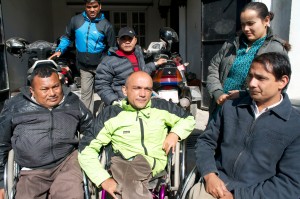Day 5 – Nepal Exchange
 Considering how long it takes to travel from Berkeley, California to Kathmandu, Nepal, you could say my stay is rather short — seven days. But, thanks to Rakshya and Nirmala who seem to know everyone in the disability rights /independent living and women’s rights communities, my schedule is jam packed from morning until night. Fortunately for me, Nirmala found a brief gap after our visit to the US Embassy (more about that visit later) and I got to meet the staff at CIL – Kathmandu today.
Considering how long it takes to travel from Berkeley, California to Kathmandu, Nepal, you could say my stay is rather short — seven days. But, thanks to Rakshya and Nirmala who seem to know everyone in the disability rights /independent living and women’s rights communities, my schedule is jam packed from morning until night. Fortunately for me, Nirmala found a brief gap after our visit to the US Embassy (more about that visit later) and I got to meet the staff at CIL – Kathmandu today.
If you didn’t know CIL-Kathmandu was in the building, you might think that it was a motor scooter shop—there’s a garage in the front of the building where at least four of the staff’s four-wheeled scooters are parked. Others rest in front of the building. Four-wheelers are used by people with disabilities — including people who use wheelchairs to travel independently around Kathmandu—there is no accessible public transportation (there’s no public transportation at all) and no private accessible transportation. Wheelchair users transfer to the seat of the scooter and pull their chairs onto the small space between the seat and handlebars (or if your chair folds, hook it onto the side of the scooter).
 I felt so completely at home with the staff of CIL – Kathmandu (of course it didn’t hurt that they were excited to have someone from Berkeley, the home of the Independent Living Movement). CIL began in 2006, just after its secretary general, Krishna Gautam (a wheelchair user), had returned from 10 months of leadership training and working in a Japanese independent living center — it changed his life and the future of many people’s lives in Nepal. Krishna returned, gathered his disabled friends and launched CIL.
I felt so completely at home with the staff of CIL – Kathmandu (of course it didn’t hurt that they were excited to have someone from Berkeley, the home of the Independent Living Movement). CIL began in 2006, just after its secretary general, Krishna Gautam (a wheelchair user), had returned from 10 months of leadership training and working in a Japanese independent living center — it changed his life and the future of many people’s lives in Nepal. Krishna returned, gathered his disabled friends and launched CIL.
Independent living in Kathmandu is challenging — like I mentioned, there is no accessible transit, there are very few sidewalks and no curb cuts, and the streets are not safe (traffic is chaotic). There is very little accessible housing, and before CIL, no personal assistance services. Additionally, all assistive devices, until very recently, came from outside the country and were difficult to get. (Whirlwind Wheelchairs — they’re interested in talking to you.)
From the beginning, CIL has focused its efforts on:
- Creating a rights-based disability perspective in Nepal and ensuring disability rights in the new constitution
- Promoting production and distribution of assistive devices inside the country
- Recruiting, training and dispatching personal assistants
- Increasing compulsory employment and the disability social security allowance
Like ILC’s in the US, they run independent living skills courses, help find housing, provide peer-to-peer counseling, raise awareness of disability rights, and so much more.
Lately, they’ve been working on developing Personal Assistance guidance for the government of Nepal in hopes of creating a national system that includes a right to free PAS for people with disabilities who need services to live independently. They very much want to work with people in the US who have experience developing policies — I told them that I’d put them in touch with ADAPT, WID and others.
It was really a pleasure to meet Krishna, Ganesh Khatri (President), Deepak KC (Executive Committee Member), Bhoj Raj Shrestha (Executive Committee Member), Devi Acharya (Executive Committee Member), Tek Bahadur Gurung (Executive Committee Member), Jamauna Subedi (Program Coordinator), and Laxmi Kunwa (Personal Assistant Coordinator).
Tomorrow: The Ministries of Education and Women, Children and Social Welfare.
